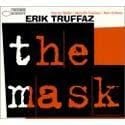
What we have here is one of those good news/bad news type of situations. The good news is, this compilation of songs from three previous French albums is imaginative, dreamy jazz tastefully played that’s attempting to do some new things with the form, and everyone involved plays very well, with the possible exception of the trumpet player. The bad news is, Erik Truffaz is the trumpet player.
Truffaz’s music, while not quite acid jazz, does attempt to mix in a little drum’n’bass, hip-hop, electronic, jungle and pop influence, only all played live, not programmed. The effect is clearly “not your father’s jazz,” but it is not enough to push the old out of the way. You must replace it with something that is not only newer, but better, and Truffaz’s experimentation simply seems to come a few years too late. This isn’t anything that Miles Davis (a cited influence) wasn’t doing better in the last years of his life, blowing rambling solos over go-go rhythms. Or that Branford Marsalis hasn’t done with his Buckshot Lefonque albums, the second of which contains a jazz take on jungle (or jungle take on jazz) that is the superior of anything here.
Having listened to this album twice as I write this, I can’t shake the feeling that I wish I liked it more. I approve of what I think Truffaz was trying to do, and applaud him for it. But on the simple, most basic level where you decide whether music works for you or not this music doesn’t work for me. I guess it’s the difference between theory and practice. In theory, Björk can’t sing on-key.
There’s no revelation behind The Mask, just lots of echoey piano and fairly sparse bass and drums. What is played behind the trumpet is fine, actually, it’s what the trumpet plays, as I indicated earlier, that is where the real trouble lies. The trumpet parts never seem to have breath in them, the rasp of life — they might as well have played by a computer for all their dryness. It’s electronic-esque music played by people who don’t want to program machines — which is as problematic as jazz played by people who don’t want to improvise. If you could separate the backing tracks from the trumpet parts, it would be like seeing a beautiful woman, then reading the poem she inspired — and finding it so much less than her.
There are no ghosts in these machines. The settings are great, but it’s like being lost in an ornate, empty, aimless ship.

![Call for Papers: All Things Reconsidered [MUSIC] May-August 2024](https://www.popmatters.com/wp-content/uploads/2024/04/all-things-reconsidered-call-music-may-2024-720x380.jpg)



